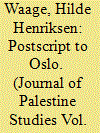|
|
|
Sort Order |
|
|
|
Items / Page
|
|
|
|
|
|
|
| Srl | Item |
| 1 |
ID:
084079


|
|
|
|
|
| Publication |
2008.
|
| Summary/Abstract |
Unlike its demands for Holocaust reparations, Israel's compensation claims for properties that Jews left behind in the Arab world have aimed not to provide individual financial reparations, but rather to counter and offset Palestinian refugees' claims for restitution and the right of return. In U.S.-sponsored negotiations in 2000, Israel announced it would drop its counterclaim policy and agreed with the Palestinians that individual compensation would be paid out to all sides from an international fund. More recently, however, a new counterclaim strategy has emerged, based not on financial reparations, but rather on an argument that a fair population and property exchange occurred in 1948. By pursuing this strategy, Israel and international Jewish organizations risk exacerbating tensions between European Jews who have received Holocaust reparations, and Arab Jews angry that their claims are held hostage to diplomatic expediency.
|
|
|
|
|
|
|
|
|
|
|
|
|
|
|
|
| 2 |
ID:
084082


|
|
|
|
|
| Publication |
2008.
|
| Summary/Abstract |
In Norway, the secret negotiations culminating in the 1993 Oslo agreement are still seen as a shining moment in the nation's history, so when the files of the entire process were discovered to be missing from government archives, a minor public scandal erupted. After laying out the Oslo "myth" and its cast of characters, the author recounts the story of the disappearance of the files, new revelations concerning their scope, and the (thus far unsuccessful) quest to recover them. The author concludes by exploring the implications of the backchannel negotiations for the entire Oslo process and its lessons for conflict resolution, particularly third-party mediation in highly asymmetrical conflicts.
|
|
|
|
|
|
|
|
|
|
|
|
|
|
|
|
| 3 |
ID:
084083


|
|
|
|
|
| Publication |
2008.
|
| Summary/Abstract |
Muhammad Hallaj, a political scientist specializing in Palestinian affairs and the Israeli-Palestinian conflict, was born in Qalqilya, Palestine, in 1932. After earning his doctorate from the University of Florida in 1966, he taught at Florida's Jacksonville University and then at the University of Jordan in Amman. Hallaj returned to the West Bank in 1975, where he served as dean of social sciences and later as academic vice president of Birzeit University before becoming the first director of the Council for Higher Education in the West Bank and Gaza. While taking a leave to go to Harvard University as a visiting scholar in 1983, Hallaj was denied a visa to return to the West Bank. Among the positions he has held since then have been editor of Palestine Perspectives (1983-1991), member (and subsequent head) of the Palestinian delegation on Refugees to themultilateral peace talks following the Madrid conference (1991-1993), and executive director of the Palestine Center and the Jerusalem Fund. At the request of JPS, Dr. Hallaj shared his memories of the 1948 war and its aftermath, which he experienced as a high school student in Jaffa, and then in Qalqilya and Tulkarm.
|
|
|
|
|
|
|
|
|
|
|
|
|
|
|
|
| 4 |
ID:
084080


|
|
|
|
|
| Publication |
2008.
|
| Summary/Abstract |
Among the handful of high-profile terrorism cases in which the U.S. government has failed to win convictions in jury trials, that of Muhammad Salah stands out. Like the cases against Sami Al-Arian, Abdelhaleem Ashqar, and the Holy Land Foundation, the case against Salah was built on the criminalization of political support for the Palestinian resistance. But while the Palestinian-Israeli conflict is at the core of all four cases, Salah's, unlike the others, was primarily about Israel: the case was manufactured in Israel, the evidence on which it was based was generated in Israel, and its prosecution depended on close U.S.-Israeli cooperation at every turn.
|
|
|
|
|
|
|
|
|
|
|
|
|
|
|
|
|
|
|
|
|